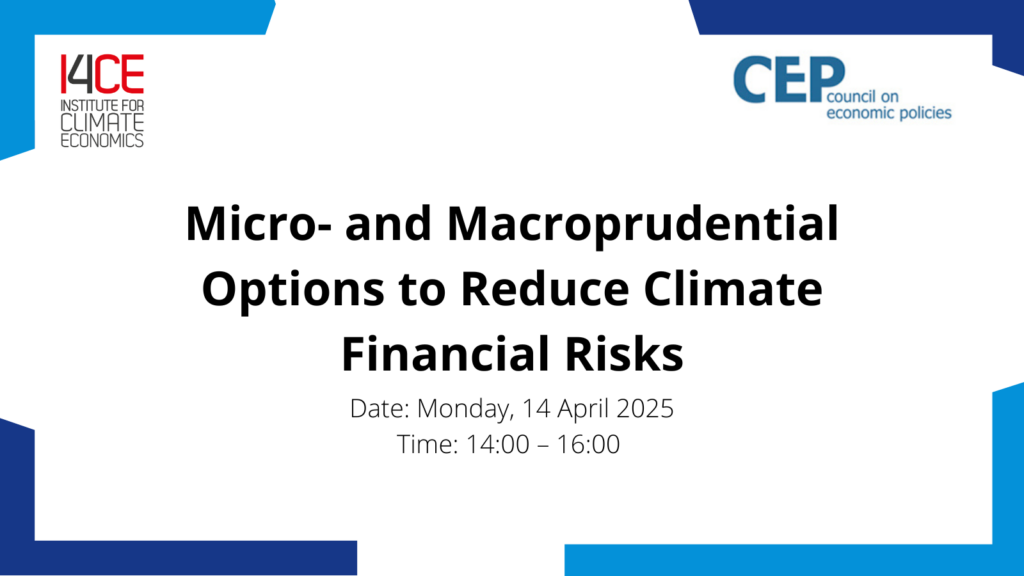Micro- and Macroprudential Options to Reduce Climate Financial Risks
Conferences - By : Natasha CHAUDHARY
The Institute for Climate Economics (I4CE) and the Council on Economic Policies (CEP) co-hosted a virtual roundtable on micro- and macroprudential policy instruments to address climate financial risks. The event brought together policymakers, academics, and other stakeholders to discuss options for financial regulators and supervisors to proactively manage climate risks in the European banking sector.
Date: Monday, 14 April 2025
Time: 14:00 – 16:00
Climate-related risks to the financial system have risen sharply in recent years. Growing regional policy uncertainty, geopolitical tensions, and economic instability increase the likelihood of a delayed transition – or, in the worst case, no transition. Financial supervisors have repeatedly warned that these scenarios pose the most significant risks to banks and the overall stability of the banking system.
Micro- and macroprudential policies are designed to address risks to the banking sector, including climate-related financial risks. Given the accelerating pace of climate-related threats, financial regulators must strengthen the banking sector’s resilience and mitigate the buildup of climate risks. This demands a proactive approach – one that actively reduces banks’ and the broader financial system’s exposure to climate financial risks.
Several policy proposals are currently being considered at the micro- and macroprudential levels. While each has the potential to support these objectives, they also come with trade-offs and unintended consequences that financial supervisors must carefully assess, particularly regarding their transmission channels and overall effectiveness.
Questions
Microprudential policy questions:
- To what extent can prudential supervisors leverage their existing toolkit – e.g. prudential transition plans, Pillar 2 processes, provisions for expected credit losses – to proactively address the build-up of climate risks?
- What factors should they consider when implementing measures to proactively manage climate financial risks and support finance for the transition?
Macroprudential policy questions:
- How can macroprudential tools – e.g. systemic risk buffers, concentration limits, borrower-based measures – be used and potentially enhanced to proactively reduce the financial system’s exposure to climate financial risks?
- What lessons can be drawn from existing frameworks to achieve this objective?
- How can European financial regulators foster cross-border coordination to ensure a coherent, proactive macroprudential approach to climate risks?
Agenda
14.00 – 14.05: Introduction, Natasha Chaudhary and Pierre Monnin
14.05 – 14.55: Microprudential Policy
Introductory remarks followed by a discussion moderated by Pierre Monnin
14.55 – 15.05: Break
15.05 – 15.55: Macroprudential Policy
Introductory remarks followed by a discussion moderated by Natasha Chaudhary
15.55 – 16.00: Final remarks, Natasha Chaudhary and Pierre Monnin
